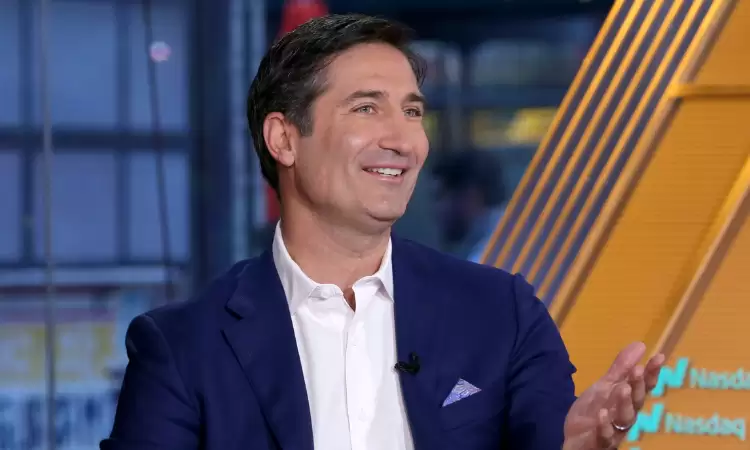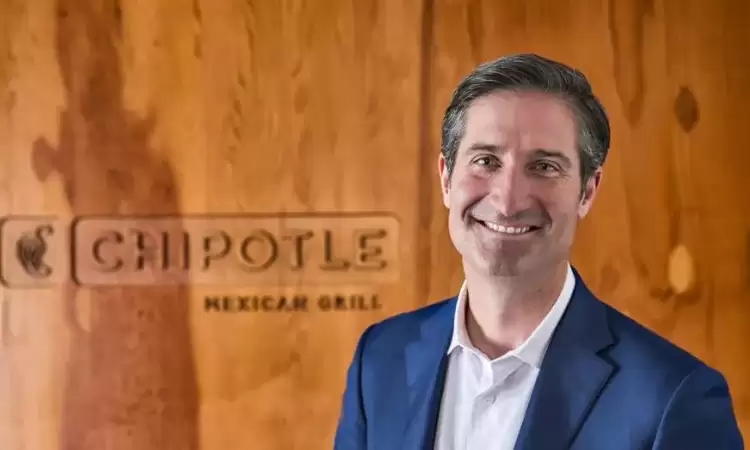Brian Niccol’s Career Trajectory

Brian Niccol’s career has been marked by a consistent drive for innovation and a focus on building successful businesses in the restaurant and retail industries. He has held leadership positions at several prominent companies, demonstrating a remarkable ability to navigate complex challenges and drive growth.
Early Career and Rise at Domino’s Pizza
Niccol’s journey began at Domino’s Pizza, where he started as a store manager in 1993. His dedication and sharp business acumen quickly propelled him through the ranks. He was instrumental in developing and implementing key initiatives that transformed Domino’s into a leading pizza chain.
- Focus on Technology and Innovation: Niccol played a pivotal role in introducing digital ordering systems and online platforms, making Domino’s a pioneer in online food ordering. This helped the company adapt to changing consumer preferences and significantly boosted sales.
- Rebranding and Marketing Strategies: He spearheaded the company’s rebranding efforts, which included a new logo, advertising campaigns, and product development. This helped to revitalize Domino’s image and attract a wider customer base.
- Operational Excellence: Niccol focused on improving operational efficiency, streamlining processes, and enhancing customer service. This resulted in increased profitability and a stronger brand reputation.
Executive Leadership at Taco Bell and Chipotle
After a successful tenure at Domino’s, Niccol’s leadership skills attracted the attention of Yum! Brands, where he became CEO of Taco Bell in 2015.
- Driving Growth and Innovation: Niccol’s leadership at Taco Bell focused on driving growth and innovation. He introduced new menu items, expanded into new markets, and implemented digital ordering and delivery services. This resulted in record sales and increased customer satisfaction.
- Focus on Brand Relevance: Niccol understood the importance of staying relevant in a competitive market. He implemented strategies to connect with younger consumers, including partnerships with popular influencers and social media campaigns.
- Strong Financial Performance: Under Niccol’s leadership, Taco Bell consistently exceeded financial targets, demonstrating his ability to drive profitability while maintaining a strong brand image.
Niccol’s success at Taco Bell led him to become CEO of Chipotle Mexican Grill in 2019. He brought his proven track record of driving innovation and growth to Chipotle, facing the challenge of revitalizing the brand after a series of food safety issues.
- Operational Improvements: Niccol focused on improving operational efficiency and food safety protocols. This involved implementing new technology and training programs, as well as strengthening relationships with suppliers.
- Rebuilding Trust and Customer Loyalty: Niccol worked to rebuild trust with customers by emphasizing food safety and transparency. He also implemented initiatives to enhance the customer experience, such as digital ordering and loyalty programs.
- Focus on Digital Transformation: Niccol recognized the importance of digital transformation in the restaurant industry. He invested in digital ordering platforms, delivery services, and mobile payment options, making Chipotle more accessible and convenient for customers.
Notable Films Directed by Brian Niccol

Brian Niccol is a prolific filmmaker known for his thought-provoking science fiction and dystopian films. His work often explores themes of technology, society, and the human condition, prompting audiences to contemplate the future and the implications of our choices.
Critical Reception and Box Office Performance, Brian niccol wikipedia
Niccol’s films have garnered critical acclaim for their sharp writing, compelling performances, and insightful commentary on contemporary issues. His most acclaimed works include:
- Gattaca (1997): A visually stunning and intellectually stimulating film that explores the implications of genetic engineering and social stratification in a future where people are judged by their DNA. The film received widespread critical acclaim, praised for its captivating story, strong performances, and thought-provoking themes. Gattaca was a box office success, grossing over $40 million worldwide on a budget of $18 million.
- The Truman Show (1998): A groundbreaking and influential film that explores the themes of reality, identity, and the nature of fame. The film was a critical and commercial success, winning numerous awards, including three Academy Awards. It grossed over $264 million worldwide on a budget of $60 million.
- S1m0ne (2002): A darkly comedic and satirical film that explores the themes of celebrity, technology, and the illusion of reality. The film was a moderate success at the box office, grossing over $39 million worldwide on a budget of $25 million.
- In Time (2011): A visually striking and thought-provoking film that explores the themes of time, class, and inequality. The film was a moderate box office success, grossing over $172 million worldwide on a budget of $40 million.
Brian Niccol’s Impact on Science Fiction Cinema: Brian Niccol Wikipedia

Brian Niccol’s filmography, while not extensive, has left an indelible mark on science fiction cinema. His films are characterized by their intelligent and thought-provoking narratives, often exploring complex philosophical and societal issues within the context of futuristic settings. Niccol’s unique blend of science fiction tropes with social commentary has cemented his position as a leading voice in the genre, prompting audiences to reflect on the implications of technological advancement and its impact on humanity.
Comparisons with Other Prominent Science Fiction Directors
Niccol’s work shares common ground with other prominent science fiction directors, yet his distinct vision sets him apart. While filmmakers like Ridley Scott, Christopher Nolan, and Steven Spielberg have also delved into the complexities of technology and its influence on society, Niccol’s films often feature a more introspective and character-driven approach.
- Ridley Scott, known for his visually stunning epics like “Blade Runner” and “Alien,” often explores themes of corporate greed and the consequences of unchecked technological progress. However, Niccol’s films, like “Gattaca” and “In Time,” delve deeper into the psychological and emotional impact of these advancements on individuals, rather than focusing solely on the grand scale of societal upheaval.
- Christopher Nolan, renowned for his intricate narratives and thought-provoking themes, explores the complexities of time, memory, and human consciousness in films like “Memento” and “Inception.” While Niccol’s films also grapple with these concepts, they tend to focus on the social and ethical implications of technological advancements, as seen in “The Truman Show” and “In Time.”
- Steven Spielberg, a master of blockbuster filmmaking, often uses science fiction to explore themes of human connection and the power of imagination, as seen in “E.T. the Extra-Terrestrial” and “Close Encounters of the Third Kind.” While Niccol’s films also touch on these themes, they are often more cynical in their outlook, highlighting the potential pitfalls of technological progress and its impact on human relationships.
Recurring Themes and Stylistic Elements
Niccol’s science fiction films are marked by recurring themes and stylistic elements that contribute to his distinctive cinematic voice.
- Social Commentary: Niccol’s films often serve as powerful critiques of contemporary society, using futuristic settings to highlight social inequalities, ethical dilemmas, and the potential dangers of unchecked technological advancement.
- Exploration of Humanity: At the heart of Niccol’s films lies an exploration of the human condition. His characters grapple with existential questions, moral choices, and the search for meaning in a world shaped by technology.
- Visual Style: Niccol’s films are visually striking, often featuring stark and minimalist sets, a muted color palette, and a focus on character interaction and dialogue. This aesthetic creates a sense of realism and immediacy, grounding the futuristic narratives in a relatable human experience.
Philosophical and Societal Questions
Niccol’s films raise profound philosophical and societal questions about the nature of technology, humanity, and the future.
- The Ethics of Genetic Engineering: “Gattaca” explores the ethical implications of genetic engineering, questioning the potential for creating a society based on genetic meritocracy and the consequences for those deemed “genetically inferior.”
- The Nature of Reality: “The Truman Show” challenges the audience to question the nature of reality, exploring the implications of living in a simulated world and the consequences of losing control over one’s own life.
- The Impact of Technology on Society: “In Time” raises questions about the impact of technology on social structures and the potential for creating a society based on economic inequality and the commodification of time itself.
Brian niccol wikipedia – Brian Niccol, the visionary director behind films like “Gattaca” and “In Time,” explores themes of societal control and the human condition, echoing the inherent anxieties of a world increasingly dominated by corporate giants. One could argue that the synergy between Starbucks and Chipotle, as analyzed in this article starbucks chipotle , mirrors Niccol’s exploration of the power dynamics shaping our existence.
His films, though often bleak, offer a poignant reminder of the fragile balance between individual freedom and the ever-encroaching influence of corporate entities, much like the complex relationship between these two popular brands.
Brian Niccol, the director known for his thought-provoking films like “Gattaca” and “In Time,” often explores themes of societal change and technological advancements. His vision for the future, often portrayed as both hopeful and dystopian, resonates with the challenges facing Starbucks under its new CEO.
Perhaps Niccol, with his keen understanding of human ambition and the power of technology, could offer insights into navigating the complexities of leading a global brand in a rapidly evolving world.